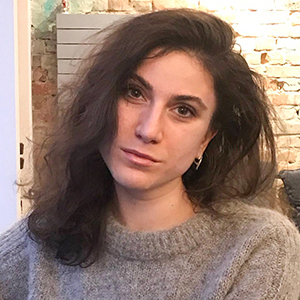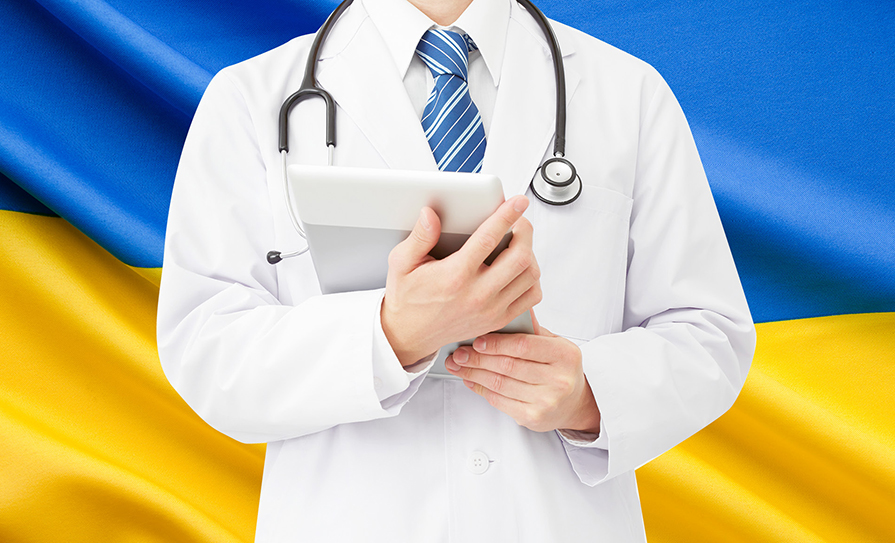Hundreds of Ukrainian doctors have arrived in Ireland since the Russian invasion of their country in February 2022 and ensuing war. However, the road to medical registration is taking time to navigate. Catherine Reilly reports
There is a desire among Ukrainian doctors in Ireland to enter the medical workforce. However, the first step many need to take is developing their English language skills.
Approximately 325 Ukrainian doctors, who have come to Ireland following the Russian invasion of their country and eruption of war, have provided details about their experience, English language training, and locations via a HSE survey.
Dr Kateryna Kachurets, a GP from Ukraine who has worked in Ireland for several years, told the Medical Independent (MI) that over 80 per cent of the doctors require some level of English language training as a starting point to their registration journey.
Dr Kachurets is pivotally involved in efforts to support Ukrainian doctors through the HSE and ICGP. She spoke to MI as a representative of the Association of Ukrainians in Ireland.
“Yes, they would love to practise medicine in Ireland, but language is the main barrier for [many of] them right now,” she said. “They have their qualifications, they want to put them to good use, they want to develop as medical professionals. So most of them do want to practise medicine in Ireland, but they do have to go through the whole process of getting registered first.”
Dr Kachurets said that, initially, some doctors may have felt their time in Ireland would be short-lived.
“But now it has been a year and becoming more and more apparent that we don’t know how long the war is going to take,” she noted. As such, some of the doctors are facing “a turning point… to make a decision about whether or not they want to go through the whole process of registration [with the Medical Council]. I mean, it is labour intensive, but it is worth it.”
According to a HSE spokesperson, the surveyed Ukrainian doctors were put in contact with the relevant postgraduate training bodies and provided with information about engagement with the Medical Council.
“They have also been provided with access to HSE library resources, and the HSE’s online national learning and development portal, to facilitate their further learning and maintenance of professional knowledge.”
Echoing Dr Kachurets’ comments, the spokesperson added: “For many doctors arriving from Ukraine the immediate challenge is to obtain the necessary English language proficiency. We know many are learning English.
“In this context, the Department of Health is funding clinical English language training to support Ukrainian health professionals in achieving these English language requirements.”
Website
A website has been established, www.regpath.ie, which provides information on the minimum English language proficiency levels required, the training available, and how to apply. This website is one of the outputs of a working group involving HSE National Doctors Training and Planning, HSE Human Resources, the Department of Health, the Medical Council, the Forum of Irish Postgraduate Medical Training Bodies, the College of Anaesthesiologists of Ireland and the Dental Council.
The Executive’s spokesperson also advised that there was “ongoing” work to develop a new policy proposal to facilitate doctors awaiting registration to undertake ‘observerships’.
This would constitute a “defined period of time” where doctors can attend a hospital or health service to observe the practice of medicine in that environment. The aim would be to become more familiar with the processes and procedures in Irish healthcare without being directly involved in patient care and in a strictly supervised fashion.
“A number of hospitals have already facilitated doctors in this way. These roles are not paid, are closely restricted, and those taking part are not working as doctors or providing patient care,” added the spokesperson.
“The HSE is not able to employ doctors to practise in Ireland without appropriate registration. The authority for registration and recognition of qualifications is the Medical Council of Ireland. We are engaging closely with the Medical Council to explore any and all options available in this regard.
“We are aware that some doctors have been employed as clerical staff, translators and other work within the health system, which does not require registration. The HSE is exploring the potential to expand and build on this. Developing opportunities to employ these doctors is part of an active programme of work within the HSE involving senior staff in clinical, operational, and human resources working in close collaboration.
“There is also close and active collaboration ongoing in respect of Ukrainian doctors arriving into Ireland between the HSE, the Department of Health, the Medical Council, and the postgraduate training bodies for medical specialties, with meetings occurring on a weekly basis.
“The Department of Health has been working to provide a range of practical supports …. This is in addition to the other supports being put in place for those arriving from Ukraine generally such as language classes.
“…. The various postgraduate training bodies have individually provided a variety of supports to doctors from their area of specialties who have been identified to them.”
Exams
While language is a barrier for many of the Ukrainian doctors, some have very good English language skills (see panel). However, the waiting time to access the written pre-registration medical exam can be lengthy.
Doctors trained outside the EU/EEA, intending to pursue registration in the general or trainee specialist divisions, may be required to sit the pre-registration examination system (PRES), which is comprised of PRES 2 and PRES 3.
The Irish Medical Council does not operate its own written pre-registration exam (PRES 2), but recognises a number of exams run by other bodies internationally. The professional and linguistic assessment board (PLAB) 1 exam, operated by the UK’s General Medical Council (GMC), tends to be the popular option due to a variety of factors and is in high demand.
A GMC spokesperson told MI: “We have worked closely with the Medical Council of Ireland to make sure that candidates in Ireland seeking registration with the Medical Council have access to a suitable exam….
“This year the GMC will provide 22,000 PLAB 1 places for all those seeking registration in the UK. This is an increase from the 18,000 places offered in 2022, and includes offering exams in Belfast and from May, at a new centre in Dublin.”
According to a spokesperson for the Irish Medical Council: “The vast majority of doctors from Ukraine will need to sit the PRES before they can register with the Medical Council. All Ukrainian doctors who have applied to sit the PRES so far have been deemed eligible to sit the PRES 3 exam, though as yet, this is a small number of doctors. If these doctors are successful in the PRES 3 exam, this will entitle them to be registered in the general division. To date, one Ukrainian qualified doctor holds qualifications which has exempted them from the PRES, and they were made eligible for registration in the general division.”
In regard to the PRES 2 requirement: “Work is ongoing to put in place an exam which can be hosted in Ireland and further details of this will be made available in the very near future and the Medical Council continues to work with partners to deliver on this.”
The Council spokesperson added: “We are prioritising applications for registration as they come in. As some applicants may have difficulty providing all of the required documentation or providing verification of their medical credentials, the Medical Council is working with applicants to identify alternative ways of providing satisfactory evidence of holding requisite qualifications. A dedicated webpage with guidance on applying for registration as well as a dedicated email inbox have been set up to handle queries from this group.” See https://medicalcouncil.ie/ukraine/.
‘There were people, acquaintances, friends, who died and were severely injured’

Dr Arina Biriukova speaks with clarity and enthusiasm about her chosen profession. She enjoys “solving complex clinical cases” and gains satisfaction from helping patients with challenging conditions.
During her two-year residency in internal medicine, she developed a particular interest in rheumatology and endocrinology. “I really like seeing the successful results like people entering remission, recovering from such conditions,” she tells the Medical Independent. “That is extremely rewarding. [These areas] can be very challenging at the same time.”
Dr Biriukova sounds like any doctor at an early stage of their career – hopeful about the opportunities ahead, but cognisant of the challenges.
The challenges she has faced over the past year, however, will surely surmount the travails of medicine. Dr Biriukova is one of over 60,000 Ukrainian people who have arrived in Ireland since Russia’s invasion of their country in 2022 and the ensuing war. It is an act of aggression that has terrorised the Ukrainian people, but has also spurred a defiant defence.
Working in her home city of Dnipro when the war erupted, Dr Biriukova continued with her hospital duties in addition to volunteering for her country’s defence.
“I provided medical supplies, [visual] equipment to search for the dead and wounded, and different ways of support to my colleagues who were on the frontline,” she recounted. She described this early period as “chaotic”. There were a limited number of doctors with experience in military medicine, for example.
“The help and involvement of everyone was extremely needed and vital, and we all dived into that,” explains Dr Biriukova, adding that the medical response has since become more structured.
Over time, the psychological burden of losing people mounted on Dr Biriukova. “There were people, acquaintances, friends, who died and were severely injured, so the distress was very severe,” she says.
Meanwhile, many of the most vulnerable stratum of the population – pregnant women, people with children and older people – fled the war to foreign countries.
According to Dr Biriukova, these people were likely to need medical surveillance, which would mean the active involvement of foreign healthcare institutions. Therefore, to remain efficient and provide medical assistance to fellow citizens thus alleviating the potential strain on international colleagues, Dr Biriukova says she took a decision to follow Ukrainians who may need her help.
Since coming to Ireland in September 2022, Dr Biriukova has remained involved in assisting her people at home. She is keen to provide medical support to those who have arrived in Ireland, particularly where there are language barriers.
“I am still in touch with people [in Ukraine]; I am still doing my best to provide them with what they might need. But at the same time I needed to ensure I am productive. Because at that stage I realised I had no sleep, I was in severe emotional distress and I understood that the civilians who are in need for medical surveillance and assistance [in other European countries] especially need the help of people who can speak their language and understand their pains; people who have sometimes shared the experience of what they have been through.”
Dr Biriukova speaks fluent English and also undertook a short medical elective in Ireland several years ago, so she had some familiarity. She is living in Co Cork and working in medical research while awaiting access to exams necessary for registration with the Medical Council. Dr Biriukova expresses gratitude to the countries, such as Ireland, that have offered protection to Ukrainians.
“We are grateful for the support we have seen since the first days of war, when people who were forced to relocate were admitted to other countries, including Ireland, and we have seen the support, which is something we are immensely grateful for. But we don’t want to become a burden to the State that has admitted us. So I think it is fair for me as a doctor to come to Ireland… and do my bit to alleviate the medical part… to treat Ukrainians and integrate into the system and help treat the Irish people.”
Dr Biriukova is waiting to take the written pre-registration exam (Plab 1). She says the earliest date she can access the exam is August 2023.
“I have successfully completed all the English language requirements, passed the IELTS test, I verified my documents through the systems that were listed, and now I am at the stage where I have to take the first medical exam…. The problem is there is a very long queue and very long list of people who are wishing to take the British exam….”
Being away from clinical practice is difficult from a professional and personal perspective. “I think this time lag is detrimental not only from the point of losing clinical practice. One’s occupation is a part of personal identity. In times of crisis, you tend to rely on this part, on something that is your strength, and that is just something that helps you and keeps you going. I think it is detrimental for medical professionals, for doctors, to be bereft of their occupation.”
She says it would be appreciated if any steps could be taken by authorities to improve access to the pre-registration exam.
“There are doctors who are still learning the language and there are people like me who have passed the language requirements and are ready to take medical exams and then start practising. So I think if something can be done to speed up this process that would be amazing, so we can start doing what we have always done, what we are here for, to start helping the people of Ireland and of Ukraine.”
More broadly, Dr Biriukova complimented the HSE for its efforts to assist doctors from Ukraine.
“I know they have started organising some English training courses for people who need support in language training and that is also amazing. I have seen some people have had observerships in the hospitals for several weeks…. I think this helps to integrate into the system, to see the system from the inside because there are those tiny, tiny practical differences.
“You know, starting with something very basic like where your instruments are when you are in your office, how you can access drugs, what scope of responsibilities your nurse has; all those tiny differences. Those differences have a huge impact when you start your work.”
Dr Biriukova said some orientation and forums to discuss ethics and legislation applicable to medical practice in Ireland would be important. In addition, knowledge of treating and communicating with a diverse patient population is vital for all doctors.
There are also many commonalities to medical practice in Ukraine and Ireland, according to Dr Biriukova. “People around the world operate by the same principles – like ‘do no harm’. We act out of the best patient interests. So that is similar. Theoretically, Ukraine has long operated European guidelines and we have been very much involved in the international scientific community, so Ukrainian doctors regularly took part in international congresses [etc].”
In the meantime, there continues to be alarming news bulletins from Dnipro and elsewhere in Ukraine, and there is a constant anxiety for family and friends.
“Several weeks ago there was this tragedy that you have probably heard of, where the Russian troops targeted a residential building [in Dnipro] and dozens of people died there…. That touched upon everyone and that is not a single case unfortunately, missiles are targeted at Dnipro every other day…. They are just preventing people from having normal lives….
“I find it difficult to talk about because on the one hand I know that Ukrainians are fighters, they do not moan, they do not complain, they adjust. For them, their freedom and their independence are the priority and people will not sacrifice that. People are adapting to the lack of mobile and internet connection, the lack of electricity. People are very creative; they find ways to keep functioning, to work, to provide for their families, to donate to humanitarian needs, to the army. People are doing everything they can to support their fellow citizens.
“But at the same time, that is all very difficult – objectively, it is very difficult. Not being able to reach your family when you see on the news there is a missile targeted at your city, and you see there was an explosion, and you are trying to reach out to your family and you cannot reach out to them as there is no electricity, but you never know what it is, whether it is electricity or… something else.”













Leave a Reply
You must be logged in to post a comment.